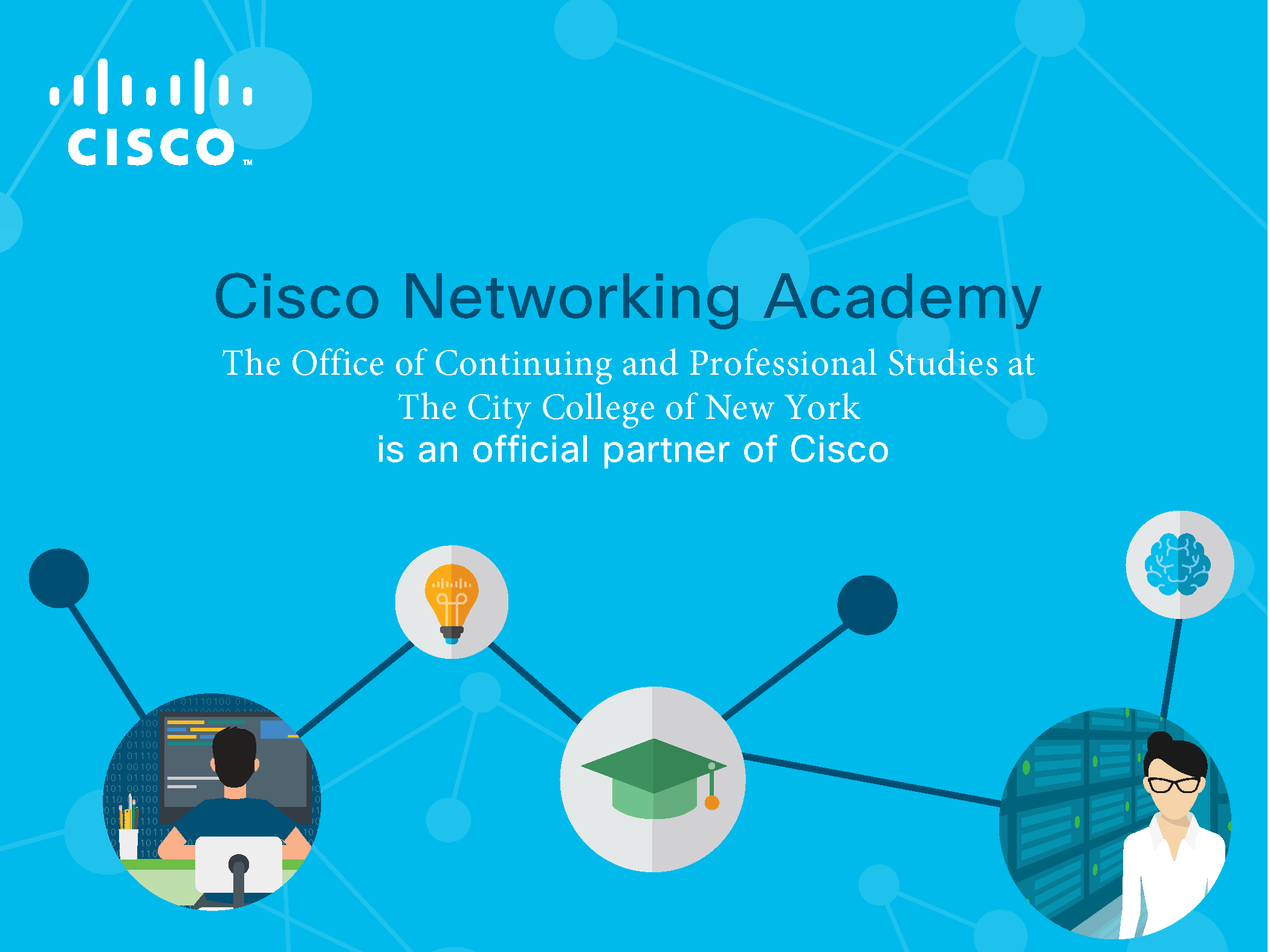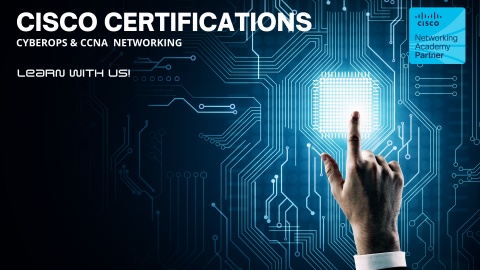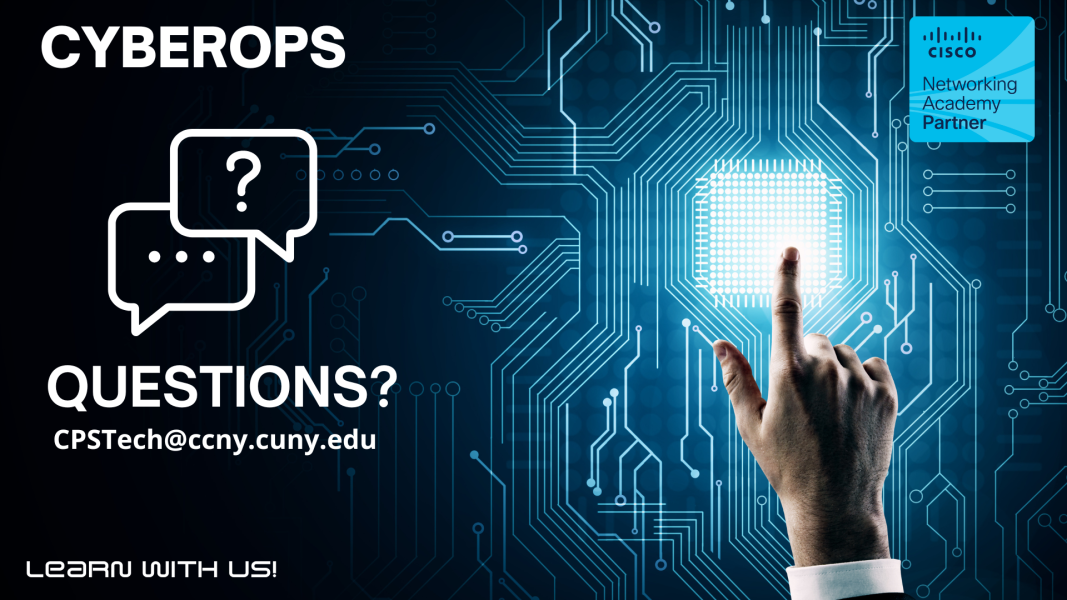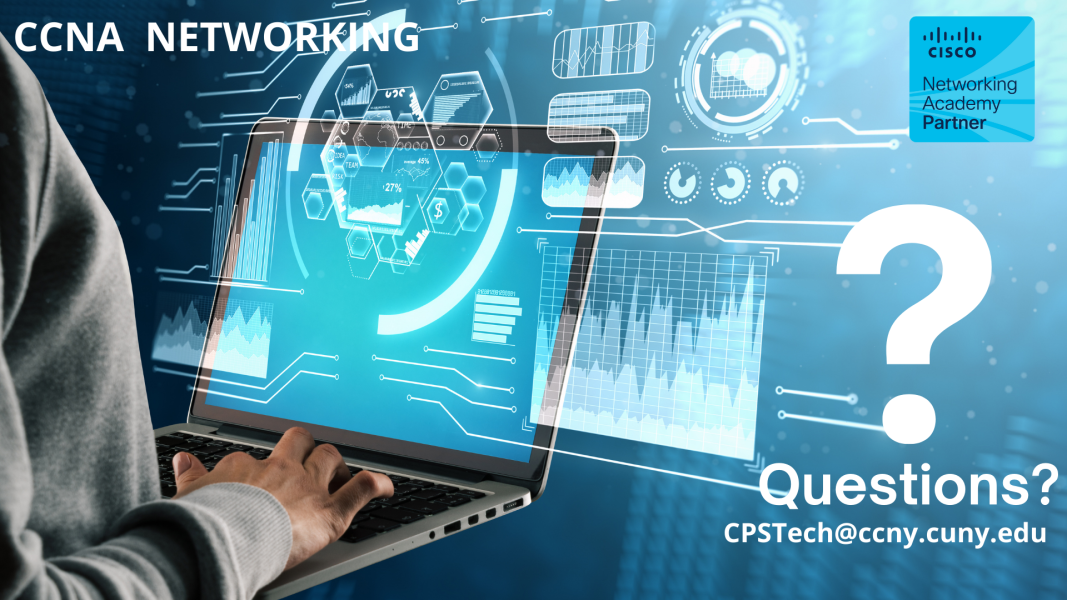CISCO Certifications
CyberOps Certification
Our CISCO CyberOps Certification focuses on securing digital assets and protecting data.
The skills and knowledge earned in Cisco's CyberOps certification training programs can prepare you to do just that. Organizations everywhere are building robust security teams to address cyber threats and they need qualified professionals they can trust to lead those teams and build the policies and systems that will protect their data. Now is the time to grow your skills, get certified, and join the next generation of security professionals in building a safer data environment. The CyberOps Certification explores cyber trends, threats, staying safe in cyberspace, and protecting personal and company data. It will also cover foundational knowledge and essential skills for all cybersecurity domains including information security, systems security, network security, ethics and laws, and defense and mitigation techniques used to protect businesses.
Tuition $1815 ($25 Registration Fee included)
CISCO Certified CyberOps Associate Certification
Three (3) Mandatory Courses to Cover the Entire Curriculum
Course Schedule:
5/13/2025 - 8/28/2025, TuTh, 5:30 PM - 9:30 PM
128 Hours
Course 1: Introduction to Cybe
Today’s interconnected world makes everyone more susceptible to cyber-attacks. Whether you’re attracted to the relativity new world of cybersecurity as a professional, or just interested in protecting yourself online and in social media, this introductory course is the answer. It explores cyber trends, threats—along with the broader topic of cybersecurity in a way that will matter to YOU. For instance, you’ll learn how to protect your personal privacy online while gaining additional insight on the challenges companies, and governmental and educational institutions face today.
You'll Learn These Core Skills:
- Learn what cybersecurity is and its potential impact to you.
- Understand the most common threats, attacks and vulnerabilities.
- Gain insights for how businesses protect their operations from attacks.
- Find the latest job trends and why cybersecurity continues to grow.
Course Hours:
15
Course 2: Endpoint Security
The Endpoint Security course provides the foundational knowledge and skills that, as a Cybersecurity Technician, you will use every day in the workplace. You will assess the vulnerability of and apply basic protections for the network, operating systems, and endpoints. Your network consists of software, hardware, and media. Operating systems make it possible to use the hardware in your network. Endpoints are the devices, such as computers, servers, mobile phones and tablets, that are used on your network. The knowledge and skills that you will learn will help you to maintain the integrity, confidentiality, and availability of your network and your data.
These course materials will give you the knowledge and skills you need to do the following:
- Explain how threat actors execute some of the most common types of cyber attacks.
- Explain network security principles.
- Explain how TCP/IP vulnerabilities enable network attacks.
- Use commands to verify the vulnerability of network applications and services.
- Troubleshoot a wireless network.
- Explain how devices and services are used to enhance network security.
- Explain the security features of the Windows operating system.
- Implement basic Linux security.
- Evaluate endpoint protection and the impacts of malware.
- Use cybersecurity best practices to secure files.
Course Hours:
30
Course 3: CyberOps Associate
Uncovering cybercrime, cyber espionage, and other networking threats are just some of the exciting cybersecurity jobs spanning across every industry. Learn the skills to join this fast-growing field and take advantage of the opportunities found in security operation centers. Feel confident that you are helping make the world a safer place by pursuing a role in this field.
In this course you will learn security concepts, security monitoring, host-based analysis, network intrusion analysis, and security policies procedures. This course also aligns with the National Initiative for Cybersecurity Education (NICE) Cybersecurity Workforce Framework to support consistent communication language for cybersecurity education, training, and workforce development.
You'll Learn These Core Skills:
- Deepen knowledge in how best to detect and respond to security incidents.
- Gain job-ready, practical skills in cybersecurity operations.
- Develop critical thinking and problem-solving skills using real equipment and Cisco Packet Tracer.
- Prepare for Cisco Certified CyberOps Associate Certification.
Course Hours:
70
CCNA Networking Certification
The Cisco Certified Network Associate (CCNA) certification is one of Cisco's most sought-after entry-level IT certifications. The CCNA exam tests the knowledge and skills that a network professional would need to possess to install, configure, and troubleshoot medium-sized networks. CCNA is a technical certification that Cisco offers for early-career networking professionals. It covers the following topics: network fundamentals. network access. Internet Protocol (IP) connectivity, IP services, security fundamentals, and automation and programmability. This course helps candidates prepare for this exam.
Tuition $2538 ($25 Registration Fee included)
6/24/25 Update: Please stay tuned for more information for Fall 2025.
Course 1: CCNA: Introduction to Networks
The first course in a 3-course CCNA series designed to prepare you for entry-level networking job.
Begin preparing for a networking career with this introduction to how networks operate. This first course in the 3-course CCNA series introduces architectures, models, protocols, and networking elements – functions needed to support the operations and priorities of Fortune 500 companies to small innovative retailers. You’ll even get the chance to build simple local area networks (LANs). Developing a working knowledge of IP addressing schemes, foundational network security, you'll be able to perform basic configurations for routers and switches. No prerequisites required. After completing all three CCNA courses, you are ready to take the CCNA Certification.
You'll Learn These Core Skills:
- Build simple LANs, perform basic configurations for routers and switches, and implement IPv4 and IPv6 addressing schemes.
- Configure routers, switches, and end devices to provide access to local and remote network resources and to enable end-to-end connectivity between remote devices.
- Develop critical thinking and problem-solving skills using real equipment and Cisco Packet Tracer.
- Configure and troubleshoot connectivity a small network using security best practices.
Course 2: CCNA: Switching, Routing, and Wireless Essentials
The second course in a 3-course CCNA series designed to prepare you for networking technician job.
This course focuses on switching technologies and router operations that support small-to-medium business networks, including wireless local area networks (WLAN) and security concepts. In this second course in a 3-course CCNA series you’ll perform basic network configuration and troubleshooting, identify and mitigate LAN security threats, and configure and secure a basic WLAN. Recommended preparation: CCNA: Introduction to Networks or having equivalent knowledge. After completing all three CCNA courses, you are ready to take the CCNA Certification.
You'll Learn These Core Skills:
- Work with routers, switches and wireless devices to configure and troubleshoot VLANs, Wireless LANs and Inter-VLAN routing.
- Configure and troubleshoot redundancy on a switched network using STP and EtherChannel.
- Develop critical thinking and problem-solving skills using real equipment and Cisco Packet Tracer.
- Explain how to support available and reliable networks using dynamic addressing and first-hop redundancy protocols.
Course 3: CCNA: Enterprise Networking, Security, and Automation
The third course in a 3-course CCNA series prepares you for networking analyst & engineering.
Large enterprises depend heavily on the smooth operation of their network infrastructures. This final course in the CCNA series describes the architectures and considerations related to designing, securing, operating, and troubleshooting enterprise networks. It covers wide area network (WAN) technologies and quality of service (QoS) mechanisms used for secure remote access along with the introduction of software-defined networking, virtualization, and automation concepts that support the digitalization of networks. Recommended preparation: CCNA: Switching, Routing, and Wireless Essentials or possessing equivalent knowledge.
You'll Learn These Core Skills:
- Work with routers and switches using OSPF in point-to-point and multiaccess networks.
- Mitigate threats and enhance network security using access control lists and security best practices.
- Develop critical thinking and problem-solving skills using real equipment and Cisco Packet Tracer.
- Understand virtualization, SDN, and how APIs and configuration management tools enable network automation.
Three (3) Mandatory Courses to Cover the Entire Curriculum
Course Hours:
210 Hours
6/24/25 Update: Please stay tuned for more information for Fall 2025.
Information Technology is everywhere and computer networks have created a hyper-connected world that we all depend on. There are plenty of job openings in IT with even more predicted over the next several years, ranging from Cybersecurity to Cloud to Programming. However the IT landscape is highly competitive and job seekers must stand out from the crowd. Companies look to recruit those individuals who are the best in their field... and that means Certification.
A technical certification is a validation of one's skills. It shows the hiring manager that you have the necessary and required knowledge in order to perform the job functions. The Cisco CCNA certification is one of the most sought after certifications in the IT industry. Cisco is a globally recognized brand and the de-facto standard of the equipment used to build computer networks and is the backbone of the Internet. When a student becomes Cisco Certified, that immediately raises their IT profile and makes them very attractive to job recruiters and hiring managers. The CCNA certification will allow the individual to move to the front of the line and give them a distinct advantage in the job application process.
The Cisco Certified Network Associate (CCNA) certification is a fantastic way to get into an IT career and grow quickly and be compensated accordingly. The CCNA is a technical achievement that is instantly recognized within the IT field and will provide a launchpad to a very lucrative career. The value of a CCNA certification cannot be underestimated. It will prove to the hiring manager that the individual is serious about IT and has the ability to learn along with the requisite technical skills that are necessary to today's world of digital infrastructure and data overload. In sum, the CCNA means IT career success with a great paycheck.


Arnold Ramsaran
Arnold holds a Master of Science degree in Cyber Security and Cyber Terrorism, he is a Systems Engineer for Cisco Systems, starting in 2013 he was a Network Engineer for the National September 11th Memorial & Museum at Ground Zero, in his time there he helped to open the Museum (May 2014) by completing their wired and wireless IT infrastructure to host the President of the United States and subsequently the Pope. Arnold is also an ITQ Instructor for Cisco Networking Academy for Rensselaer Polytechnic Institute. As an ITQ Instructor he trains the U.S. Navy training officers on naval bases, other Cisco Academy instructors and legally blind students. Arnold also holds a Bachelor’s degree in Computer Science.
Link to: LinkedIn
Last Updated: 06/30/2025 11:58





